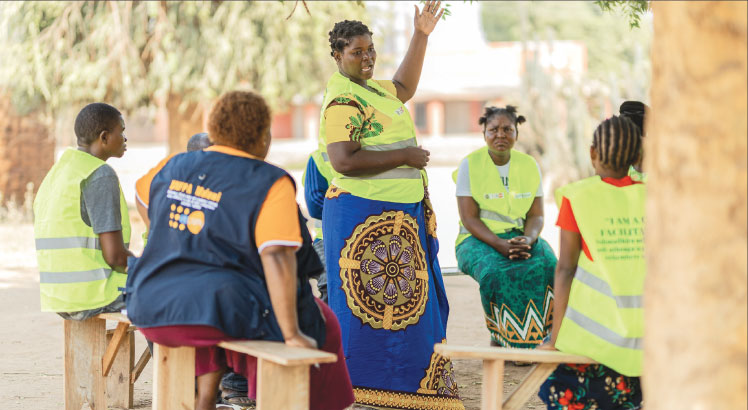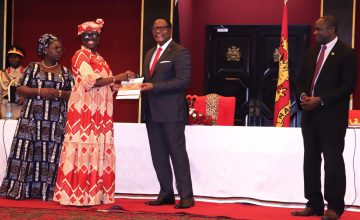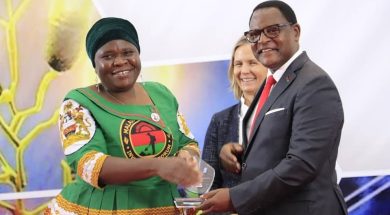Community leaders champion girls’ rights
Fanny Galeta, 16, was speechless when her mother told her to join her first initiation ceremony.
The girl had heard many stories about the rite of passage, but was not sure whether she needed to participate.
But the choice was not hers.
Fanny’s parents and community had a deep respect for the age-old practice every girl in her village had to go through.
“No one can truly tell you what happens there,” she says. “Many things are kept secret.”
Fanny approached her older peers who had been there, but “they just laughed” and “told me that I will have to discover on my own”.
A bittersweet
When the time came, Fanny was accompanied by her mother to a secluded camp in a village forest where she spent the next three weeks.

She recalls being welcomed by four elderly women, the initiators.
“We weren’t supposed to go out of the camp or see anyone during our stay. Even those who brought us food were not allowed to talk to us,” says Fanny.
The initiation right was bittersweet for Fanny as some of the things she learnt were helpful but others, especially “sex education”, nearly ruined her life.
Fanny says the initiates were taught “how to handle any man” in bed.
She recalls: “After graduating, the initiators told us we had come of age, meaning that we were ready for marriage.
“I decided to try out what we had learnt and found myself in a sexual relationship.”
With this sexual affair, Fanny slowly lost interest in school.
“My boyfriend and I agreed to marry,” she says. “But when my mother heard about it, she sought help from the community police since I was underage. I fled the area to stay with my grandmother so that they don’t arrest my boyfriend.”
When Fanny moved to her grandmother’s place, the village head had heard about her story and sent envoys to bring her back.
“Our district is known for harmful traditional practices which have derailed the future of many girls,” explains Fraiton Pintu, the group village head. “We need to change this. If we fail, generations to come will frown upon our legacy.”
Pintu is a passionate advocate for girls’ education and chairperson of Mlirima Development Network, which fights against gender-based violence and child marriage.
Together with her team, the community leader engaged Fanny and supported her with counselling.
“She listened to us and agreed to go back to school,” he says. “We also warned the boy that we would report to the police if he continued seeing Fanny.”
To discharge their duties better, Mlirima Development Network leaders were trained in gender and rights by the United Nations Population Fund (UNFPA) under the Safeguard Young People programme.
The training under the programme funded by the Swiss Agency for Development and Cooperation builds the capacity of the grassroots organisations to raise awareness on the negative impact of child marriages, reduce GBV, foster gender equality, and empower survivors.
Armed with knowledge and skills, the network has withdrawn 30 girls aged below 18 from illicit marriages and sent them back to school.
One of them is Fanny, who passed her Primary School Leaving Certificate of Education examination.
“I am glad that I listened to the advice,” she says. “Now, my family is proud of me as the only girl to go to secondary school.”
Bylaws
Fanny’s story inspired GVH Pintu to review some of the cultural practices in her community and convene his subordinate chiefs to form bylaws that ban initiation ceremonies from spilling into the school calendar.
The meeting also resolved to change the initiators as the village heads noted a huge generation gap between the old initiators and the girls being initiated.
“Times have changed and yet we still had old women teaching young girls obsolete traditions,” says Pintu.
During the meeting, the village elders chose progressive young women to preside over the initiation ceremonies.
“We can’t do away with them completely as they are part of our culture, but we can reform them from within,” he says.
Hanna Mkamwa, 35, is happy to be among the new initiators. She says the responsibility will help her connect with the girls and share with them vital information for future use.
“I have been working with girls for years as a mothers’ group member, so I know the problems they go through when they are growing up,” she explains. “As an initiator, I will use my knowledge to shape the girls into future leaders and not child brides as was happening.”






One Comment